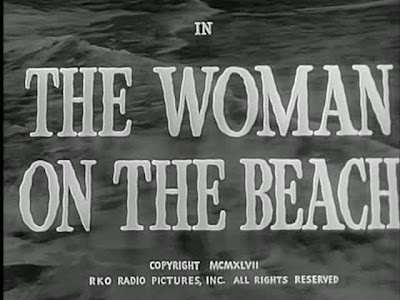Woman on the Beach

Some of the films on my 1947 list I approach cold, without previous knowledge or reading. And maybe I shouldn't confess this, but I really have little knowledge of Jean Renoir's work after leaving France. I have seen The Southerner (1945) a couple of times and had a vague sense of the reputation of aesthetic mismatch, of a great European auteur who suffered from the transplant to a more rigid studio system.
And at first blush, The Woman on the Beach, seems to bear that reputation out. The 70-minute RKO sort-of-noir shows much evidence of cheap production values and a bare-bones house style, from the sets...

....to the starkly plain lighting setups.


And then there's the uber-psychologized shellshock-vet motif common to so many of the postwar films. I'm still not quite sure what the nightmare scenes of the Robert Ryan character are doing in the film or if the frame structure actually makes any sense.
 But the film is about illogic, and feels like a long-lost poetic realism classic. Particularly in the eponymous scenes on the beach, where the fog effect is unexpected in its heavy-handedness.
But the film is about illogic, and feels like a long-lost poetic realism classic. Particularly in the eponymous scenes on the beach, where the fog effect is unexpected in its heavy-handedness. The main theme centers on an artist, Tod (Charles Bickford), whose blindness has kept him from painting and has imprisoned him to live in the past. (There are some clear parallels to Renoir père's battle with arthritis). It's not unusual for a Hollywood to use blindness as a conceit, but here the treatment is more complex. To begin with, the script has a genuine empathy for Tod's psychology - even more than it does for the ostensible main characters played by Ryan and Joan Bennett. Furthermore, the development of the narrative changes what the film seems to be saying about blindness and artistic creation.
The main theme centers on an artist, Tod (Charles Bickford), whose blindness has kept him from painting and has imprisoned him to live in the past. (There are some clear parallels to Renoir père's battle with arthritis). It's not unusual for a Hollywood to use blindness as a conceit, but here the treatment is more complex. To begin with, the script has a genuine empathy for Tod's psychology - even more than it does for the ostensible main characters played by Ryan and Joan Bennett. Furthermore, the development of the narrative changes what the film seems to be saying about blindness and artistic creation.I know in this review I've switched back to auteurist film critic mode instead of film historian mode, but I also can't shake the feeling that this work is at best merely adapting to industrial trends and at worst marginal to the direction of those trends. Much of my work with 1947 is to think about ways of constructing the "typical" of the studio system, but - unless I see more to see new patterns - Woman on the Beach seems not to match these ideal types.
Comments